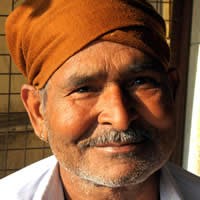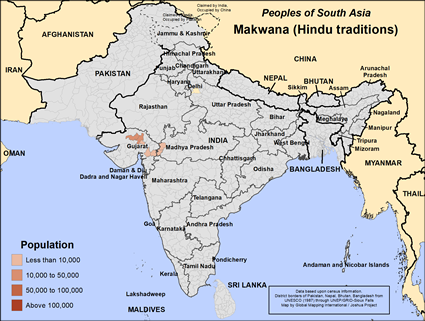Makwana (Hindu traditions) in India

Photo Source:
Copyrighted © 2026
Isudas All rights reserved. Used with permission |

Map Source:
People Group data: Omid. Map geography: UNESCO / GMI. Map Design: Joshua Project
|
| People Name: | Makwana (Hindu traditions) |
| Country: | India |
| 10/40 Window: | Yes |
| Population: | 67,000 |
| World Population: | 67,000 |
| Primary Language: | Gujarati |
| Primary Religion: | Hinduism |
| Christian Adherents: | 0.00 % |
| Evangelicals: | 0.00 % |
| Scripture: | Complete Bible |
| Ministry Resources: | Yes |
| Jesus Film: | Yes |
| Audio Recordings: | Yes |
| People Cluster: | South Asia Hindu - other |
| Affinity Bloc: | South Asian Peoples |
| Progress Level: |
|
Introduction / History
Makwana is a sub-group of the larger Koli caste. In the 19th century the Makwana could not or would not pay their taxes to the British government. As a result, the land of the Makwana was taken away and given to other castes. The Makwana began raiding and stealing from the occupants of their former land. The British then classified the Makwana are a Criminal Caste. The Makwana started a rebellion against the British in 1914 while the British were fighting in WWI.
Upon the Partition of India in 1947, the new government granted the Makwana status as an Other Backward Caste which means they are eligible for certain government jobs and special university admissions. As Makwana have become educated, many have become successful businesspersons. Many Makwana still work in their traditional occupations of agriculture and fishing.
The Makwana speak Gujarati as their primary language. Educated Makwana also speak Hindi and English. A revised complete Gujarati Bible became available in 2021. Most Makwana live in the western Indian state of Gujarat.
What Are Their Lives Like?
The lifestyle of the Makwana depends much upon their educational level. College graduates work in Gujarati cities. They own businesses and work as managers and business employees. Less educated Makwana maintain in rural areas work farmers and fishermen. Some Makwana own the land they farm while others work on land as tenants. Their main crops are rice, vegetables, fruits, tea, bananas, palm oil, and grains.
Many young Makwana are leaving their homes in rural areas and moving to cities looking for economic and educational opportunities.
Monogamy or marriage to one spouse is the norm. Makwana tend to marry within their group.
What Are Their Beliefs?
The large majority of the Makwana are Hindus. A small number became Muslims during the period when Muslims dominated the government of Gujarat. The central god of the Makwana is Krishna, the 8th avatar of Vishnu, the preserver god.
Hinduism is the ancient religion of India. Hinduism is a catch-all phrase for the local religions of South Asia, so it is very diverse. At the popular level, Hindus worship and serve the gods of the Hindu pantheon. They visit Hindu temples and offer prayers, food, flowers, and incense to their gods in hopes of gaining protection and benefits. They do not have a personal or familial relationship with their gods as Christians do. There are other Hindus who are much more philosophical, especially among the Brahmins.
Almost all Hindus participate in yearly celebrations like Holi, the festival of colors and the start of spring / Diwali, the festival of lights / Navratri, the celebration of autumn / and Rama Navami, Rama's birthday.
There are few if any Christians among the Makwana of India.
What Are Their Needs?
The worldview of a Hindu is much different than the one of Christians. The Makwana must come to understand that there is only one true Creator God. He is absolutely holy and hates sin. The Makwana will need to see the love and holiness of Christ demonstrated by believers.
Prayer Points
Ask the Lord to send workers to the Hindu Makwana of western India.
Pray the Lord moves Indian believers to reach out to and build redemptive relationships with the Makwana.
Pray that the Lord leads Makwana to tune into Gujarati radio programs and read the Gujarati Bible.
Pray for the Holy Spirit to raise up a disciple making movement among the Makwana of India.